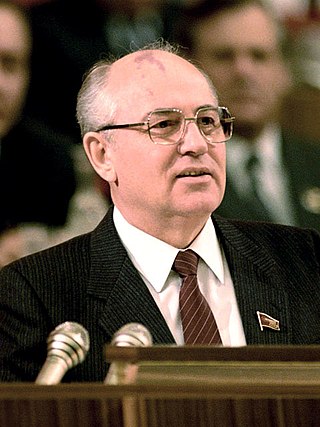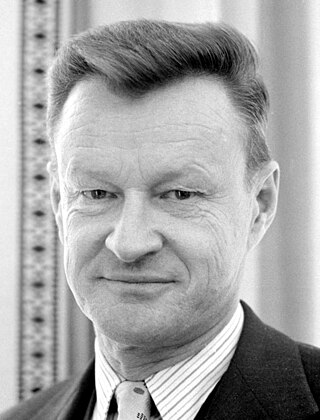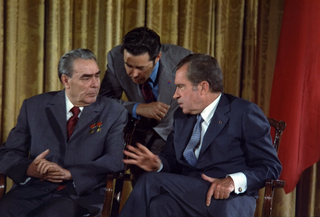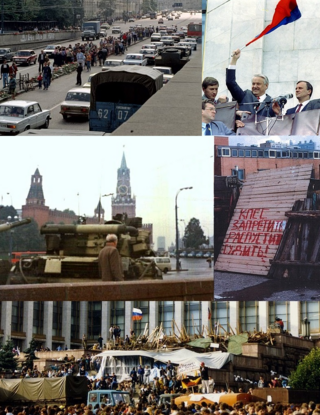
The Brezhnev Doctrine was a Soviet foreign policy that proclaimed that any threat to "socialist rule" in any state of the Soviet Bloc in Central and Eastern Europe was a threat to all of them, and therefore, it justified the intervention of fellow socialist states. It was proclaimed in order to justify the Soviet-led occupation of Czechoslovakia earlier in 1968, with the overthrow of the reformist government there. The references to "socialism" meant control by the communist parties which were loyal to the Kremlin. Soviet leader Mikhail Gorbachev repudiated the doctrine in the late 1980s, as the Kremlin accepted the peaceful overthrow of Soviet rule in all its satellite countries in Eastern Europe.
The history of the Soviet Union from 1982 through 1991 spans the period from the Soviet leader Leonid Brezhnev's death until the dissolution of the Soviet Union. Due to the years of Soviet military buildup at the expense of domestic development, and complex systemic problems in the command economy, Soviet output stagnated. Failed attempts at reform, a standstill economy, and the success of the proxies of the United States against the Soviet Union's forces in the war in Afghanistan led to a general feeling of discontent, especially in the Soviet-occupied Baltic countries and Eastern Europe.

Mikhail Sergeyevich Gorbachev was a Soviet and Russian politician who served as the last leader of the Soviet Union from 1985 to the country's dissolution in 1991. He served as General Secretary of the Communist Party of the Soviet Union from 1985 and additionally as head of state beginning in 1988, as Chairman of the Presidium of the Supreme Soviet from 1988 to 1989, Chairman of the Supreme Soviet from 1989 to 1990 and the president of the Soviet Union from 1990 to 1991. Ideologically, Gorbachev initially adhered to Marxism–Leninism but moved towards social democracy by the early 1990s. He was the first and only Soviet leader born after the country's foundation.

Yuri Vladimirovich Andropov was a Soviet politician who was the sixth leader of the Soviet Union and the fourth General Secretary of the Communist Party of the Soviet Union, taking office in late 1982 and serving until his death in 1984.

Leonid Ilyich Brezhnev was a Soviet politician who served as General Secretary of the Communist Party of the Soviet Union from 1964 until his death in 1982, and Chairman of the Presidium of the Supreme Soviet from 1960 to 1964 and again from 1977 to 1982. His 18-year term as General Secretary was second only to Joseph Stalin's in duration.

Zbigniew Kazimierz Brzeziński, known as Zbig, was a Polish-American diplomat and political scientist. He served as a counselor to Lyndon B. Johnson from 1966 to 1968 and was Jimmy Carter's National Security Advisor from 1977 to 1981. As a scholar, Brzezinski belonged to the realist school of international relations, standing in the geopolitical tradition of Halford Mackinder and Nicholas J. Spykman, while elements of liberal idealism have also been identified in his outlook. Brzezinski was the primary organizer of The Trilateral Commission.

The Cold War was a period of geopolitical tension between the United States and the Soviet Union and their respective allies, the Western Bloc and the Eastern Bloc, that started in 1947, two years after the end of World War II, and lasted until the fall of the Soviet Union in 1991.

Détente is the relaxation of strained relations, especially political ones, through verbal communication. The diplomacy term originates from around 1912, when France and Germany tried unsuccessfully to reduce tensions.

Dmitriy Fyodorovich Ustinov was a Soviet politician and a Marshal of the Soviet Union during the Cold War. He served as a Central Committee secretary in charge of the Soviet military–industrial complex from 1965 to 1976 and as Minister of Defence of the Soviet Union from 1976 until his death in 1984.

Yegor Kuzmich Ligachyov was a Soviet and Russian politician who was a high-ranking official in the Communist Party of the Soviet Union (CPSU), and who continued an active political career in post-Soviet Russia. Originally an ally of Mikhail Gorbachev, Ligachyov became a challenger to his leadership.

The 1991 Soviet coup d'état attempt, also known as the August Coup, was a failed attempt by hardliners of the Communist Party of the Soviet Union (CPSU) to forcibly seize control of the country from Mikhail Gorbachev, who was Soviet President and General Secretary of the CPSU at the time. The coup leaders consisted of top military and civilian officials, including Vice President Gennady Yanayev, who together formed the State Committee on the State of Emergency (GKChP). They opposed Gorbachev's reform program, were angry at the loss of control over Eastern European states and fearful of the New Union Treaty, which was on the verge of being signed by the Soviet Union (USSR). The treaty was to decentralize much of the central Soviet government's power and distribute it among its fifteen republics; Yeltsin's demand for more autonomy to the republics opened a window for the plotters to organize the coup.

After the Russian Revolution, in which the Bolsheviks took over parts of the collapsing Russian Empire in 1918, they faced enormous odds against the German Empire and eventually negotiated terms to pull out of World War I. They then went to war against the White movement, pro-independence movements, rebellious peasants, former supporters, anarchists and foreign interventionists in the bitter civil war. They set up the Soviet Union in 1922 with Vladimir Lenin in charge. At first, it was treated as an unrecognized pariah state because of its repudiating of tsarist debts and threats to destroy capitalism at home and around the world. By 1922, Moscow had repudiated the goal of world revolution, and sought diplomatic recognition and friendly trade relations with the capitalist world, starting with Britain and Germany. Finally, in 1933, the United States gave recognition. Trade and technical help from Germany and the United States arrived in the late 1920s. After Lenin died in 1924, Joseph Stalin, became leader. He transformed the country in the 1930s into an industrial and military power. It strongly opposed Nazi Germany until August 1939, when it suddenly came to friendly terms with Berlin in the Molotov–Ribbentrop Pact. Moscow and Berlin by agreement invaded and partitioned Poland and the Baltic States. Stalin ignored repeated warnings that Hitler planned to invade. He was caught by surprise in June 1941 when Nazi Germany invaded the Soviet Union. The Soviet forces nearly collapsed as the Germans reached the outskirts of Leningrad and Moscow. However, the Soviet Union proved strong enough to defeat Nazi Germany, with help from its key World War II allies, Britain and the United States. The Soviet army occupied most of Eastern Europe and increasingly controlled the governments.

Relations between the Soviet Unionand Japan between the Communist takeover in 1917 and the collapse of Communism in 1991 tended to be hostile. Japan had sent troops to counter the Bolshevik presence in Russia's Far East during the Russian Civil War, and both countries had been in opposite camps during World War II and the Cold War. In addition, territorial conflicts over the Kuril Islands and South Sakhalin were a constant source of tension. These, with a number of smaller conflicts, prevented both countries from signing a peace treaty after World War II, and even today matters remain unresolved.

The Cold War from 1979 to 1985 was a late phase of the Cold War marked by a sharp increase in hostility between the Soviet Union and the West. It arose from a strong denunciation of the Soviet invasion of Afghanistan in December 1979. With the election of Prime Minister Margaret Thatcher in 1979, and American President Ronald Reagan in 1980, a corresponding change in Western foreign policy approach toward the Soviet Union was marked by the rejection of détente in favor of the Reagan Doctrine policy of rollback, with the stated goal of dissolving Soviet influence in Soviet Bloc countries. During this time, the threat of nuclear war had reached new heights not seen since the Cuban Missile Crisis of 1962.

The time period of around 1985–1991 marked the final period of the Cold War. It was characterized by systemic reform within the Soviet Union, the easing of geopolitical tensions between the Soviet-led bloc and the United States-led bloc, the collapse of the Soviet Union's influence in Eastern Europe, and the dissolution of the Soviet Union in 1991.

The United States and Russia maintain one of the most important, critical, and strategic foreign relations in the world. Both nations have shared interests in nuclear safety and security, nonproliferation, counterterrorism, and space exploration. Due to the Russian invasion of Ukraine, relations became very tense after the United States imposed sanctions against Russia. Russia placed the United States on a list of "unfriendly countries", along with South Korea, Taiwan, European Union members, NATO members, Switzerland, Australia, New Zealand, Singapore, Micronesia, Japan and Ukraine.

Relations between the Soviet Union and the United States were fully established in 1933 as the succeeding bilateral ties to those between the Russian Empire and the United States, which lasted from 1776 until 1917; they were also the predecessor to the current bilateral ties between the Russian Federation and the United States that began in 1992 after the end of the Cold War. The relationship between the Soviet Union and the United States was largely defined by mistrust and tense hostility. The invasion of the Soviet Union by Germany as well as the attack on the U.S. Pacific Fleet at Pearl Harbor by Imperial Japan marked the Soviet and American entries into World War II on the side of the Allies in June and December 1941, respectively. As the Soviet–American alliance against the Axis came to an end following the Allied victory in 1945, the first signs of post-war mistrust and hostility began to immediately appear between the two countries, as the Soviet Union militarily occupied Eastern European countries and turned them into satellite states, forming the Eastern Bloc. These bilateral tensions escalated into the Cold War, a decades-long period of tense hostile relations with short phases of détente that ended after the collapse of the Soviet Union and emergence of the present-day Russian Federation at the end of 1991.

Boris Nikolayevich Yeltsin was a Soviet and Russian politician who served as the president of Russia from 1991 to 1999. He was a member of the Communist Party of the Soviet Union from 1961 to 1990. He later stood as a political independent, during which time he was viewed as being ideologically aligned with liberalism.
George H. W. Bush, whose term as president lasted from 1989 until 1993, had extensive experience with US foreign policy. Unlike his predecessor, Ronald Reagan, he downplayed vision and emphasized caution and careful management. He had quietly disagreed with many of Reagan's foreign policy decisions and tried to build his own policies. His main foreign policy advisors were Secretaries of State James Baker, a longtime friend, and National Security Advisor Brent Scowcroft. Key geopolitical events that occurred during Bush's presidency were:
Queen Elizabeth II of the United Kingdom of Great Britain and Northern Ireland, her husband Prince Philip, Duke of Edinburgh and Foreign Secretary Douglas Hurd made a state visit to Russia from 17 to 20 October 1994, hosted by the President of Russia, Boris Yeltsin. It is the first and so far only visit by a reigning British monarch on Russian soil.















